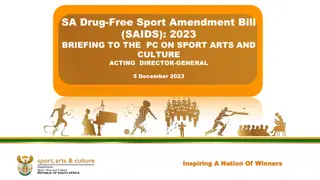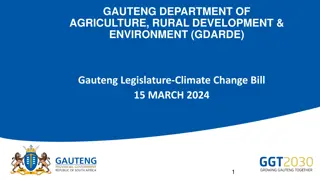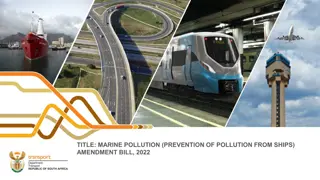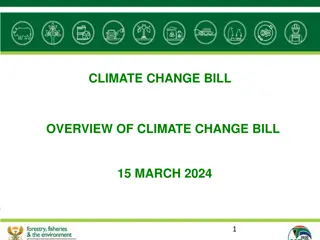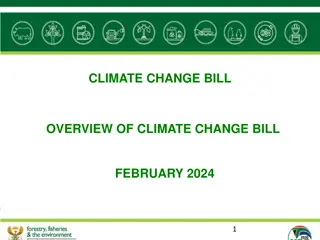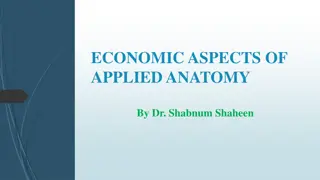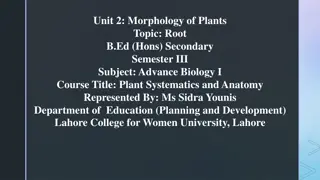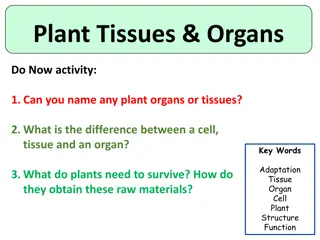Plant Health (Phytosanitary) Bill B14-2021 Presentation
Briefing the Portfolio Committee on Agriculture, Land Reform, and Rural Development on the Plant Health (Phytosanitary) Bill. Key concepts, problems addressed, historical timeline, and significance of the bill for South Africa's agricultural security are discussed.
Download Presentation

Please find below an Image/Link to download the presentation.
The content on the website is provided AS IS for your information and personal use only. It may not be sold, licensed, or shared on other websites without obtaining consent from the author. Download presentation by click this link. If you encounter any issues during the download, it is possible that the publisher has removed the file from their server.
E N D
Presentation Transcript
PLANT HEALTH (PHYTOSANITARY) BILL [B14-2021] PRESENTATION TO THE PORTFOLIO COMMITTEE ON AGRICULTURE, LAND REFORM AND RURAL DEVELOPMENT 19 MAY 2023
1. PURPOSE To brief the Portfolio Committee (PC) on Agriculture, Land Reform and Rural Development on the Plant Health (Phytosanitary) Bill
2. INTRODUCTION Key concepts/ Definitions Phytosanitary measures- refers to official measures, regulations or procedures aimed at: preventing introduction and/or spread of quarantine pests, and limiting the economic impact of regulated non-quarantine pests. Quarantine pest- means a pest of potential economic importance to the area endangered thereby and not yet present there or present but not widely distributed and being officially controlled. Regulated pest- means a quarantine pest or a regulated non-quarantine pest. South Africa is a signatory member of: The World Trade Organization Agreement on the Application of Sanitary & Phytosanitary Measures (WTO-SPS Agreement) and The International Plant Protection Convention (IPPC).
3. PROBLEM STATEMENT The introduction and spread of potentially damaging pests in South Africa could have a significantly negative impact on South African bio-security, agricultural production and food security as well as on market access. Deficiencies of the existing Agricultural Pests Act, 1983 (Act No.36 of 1983): Predates the Constitution of the Republic of South Africa; Predates the International Plant Protection Convention (IPPC, 1997); Definitions not aligned to the IPPC standards; No provision for the National Plant Protection Organisation of SA (NPPOZA) accordance with the IPPC (Article IV), and its functions No provision for export control, re-export and in-transit control (emphasis was on import- and national control). in
4. TIMELINE FOR PROCESSING THE PLANT HEALTH BILL MILESTONE OF THE PLANT HEALTH BILL DATE ACCOMPLISHED Publication in the Government Gazette for public comments National Workshop with key stakeholders 26 Oct. 2012 12 March 2013 Notification via WTO-SPS transparency system: 60 days for comment December 2013 1st precertification of the Bill: OCSLA Presentation to DG Cluster and recommendation July 2014 01 Oct. 2014 Socio-Economic Impact Assessment (SEIAs) certification to proceed with parliamentary process 20 Oct. 2015 Cabinet approval of the Plant Health (Phytosanitary) Bill to proceed with the Parliamentary process 17 Feb. 2016 Final certification: OCSLA 24 Oct. 2016 Introduction of the Bill in the National Assembly 06 March 2017 Withdrawal of the Bill in accordance with Rule 334: to allow the portfolio committee in order to conclude on business before it ahead of the National election 06 May 2018 2nd certification of the Bill by OCSLA: the Bill was found to be constitutional and that it does not conflict any other national law 20 Sept. 2019 Presentation to the ESIEID DG Cluster for recommendation. The Bill was again fully recommended and supported to be submitted to Cabinet. 19 Oct. 2020 Socio Economic Impact Assessment: Certificate Nov. 2020 Presentation of the Bill to Cabinet for approval and Recommendation May 2021 Bill introduced in the National Assembly July 2021
5. OVERVIEW OF THE AGRICULTURAL PESTS ACT, 1983 (ACT NO.36 OF 1983): being repealed
7. OBJECTIVES OF THE BILL To provide for phytosanitary measures to prevent the introduction, establishment and spread of regulated pests in order to safeguard South African agriculture and plant natural resources . In turn, this supports: Safe and fair international and domestic trade Maintenance of current export markets and establishment of new markets Crop production/Food security programmes Economic growth and development Job creation
8. SUMMARY OF THE PLANT HEALTH BILL: OVERVIEW To provide for phytosanitary measures to prevent the introduction, establishment and spread of regulated pests. Plant Health (Phytosanitary) Bill Definitions in accordance with the International Plant Protection Convention (IPPC): International Standards for Phytosanitary Measures (ISPMs). Re-export control provides for re-export of consignments imported into South Africa for further export to another country. National control of plant pests provides for restriction of infested plant material from infested areas to non- infested areas as well as quarantining an area . Import control of plants and plants products in order prevent the introduction, establishment and spread of regulated pests. Export control of plants and plants products in order to comply with import requirements of the importing country. Establishment of the National Plant Protection Organization of South Africa in items of the international obligations Re-export phytosanitary certificate will be required to maintain consignment integrity and security. Directorates Plant Health, Inspection Services , and Food Import and Export Standards (Within the DALRRD). Phytosanitary certificate will be required . Import permit will be required.
9. CLAUSE BY CLAUSE ANALYSIS Relevant sections Provision subject Explanatory summary Section 1 Definition Definition are aligned to the International Plant Protection Convention, glossary of phytosanitary terms International Standards for Phytosanitary Measures (ISPMs 5). In this clause certain terms and expressions are defined so that the contents of the Bill may be more clear. Section 2 Responsibility of the administration of the Act The Minister of Agriculture, Land Reform & Rural Development is responsible for the administration of this Act. Section 3 Power of the Minister Provides for power of minister to make regulations and control measures to further the objectives of the Act Section 4 Prescribing of the control measures The Minister may prescribe control measures which must be complied with by users of land in order to achieve the objectives of the Bill. These control measures may include quarantine measures and restriction movement of infested material.
10. CLAUSE BY CLAUSE ANALYSIS Provision subject Explanatory summary Relevant sections Section 5 Designation of the executive officer Provides for the designation of the executive officer wherein the Minister must designate the Director in the department responsible for phytosanitary measures as the executive officer. This section empowers an executive officer to instruct a user of land by written order to comply with a control measure in respect of a quarantine area or regulated area determined in that order. These powers include confiscating and destroying of the controlled goods. Provides for orders with regard to land which must be served in the prescribed manner. The order may include quarantining and areas, restricting movement and that something be destroyed. Section 6 Power of the executive officer Section 7 Order with regard to land
CLAUSE BY CLAUSE ANALYSIS Relevant sections Provision subject Explanation summary Section 8 Power of entry, search, inspection and seizure Provides that an authorised person may on the authority of a warrant enter, search and inspect any land to combat pests or to carry out a control measure. Section 9, 8 and 11 Establishment of the National Plant Protection Organization of South Africa Provides for the establishment of the National Plant Protection Organisation of South Africa and the composition of the National Plant Protection Organisation of South Africa (NPPOZA), required in terms of membership of the IPPC. It also provides for the functions of the NPPOZA in accordance with the IPPC. Provides for import regulations in order to prevent the introduction and spread of regulated pests. Section 12 Import regulations
CLAUSE BY CLAUSE ANALYSIS Relevant sections Provision subject Explanatory summary Sections 13 Import of regulated articles Provides that regulated articles may be imported only on the authority of a permit and under certain conditions. The Minister may by notice in the Gazette make provision for certain exceptions. Sets out the conditions for exporting regulated articles. Therefore a person exporting shall comply with the import requirements of the importing country. Provides provisions for the re-export of consignments imported into the Republic for further export to another country. Sets out the requirements and/or conditions that should be adhered to by a person transiting a consignment of regulated articles through the Republic to another country. Section 14 Export of regulated articles Section 15 Re-export Section 16 In-Transit
CLAUSE BY CLAUSE ANALYSIS Relevant sections Provision subject Explanatory summary Section 17 Declaration of regulated pests Provides for conditions under which the executive officer may declare regulated pests (quarantine pest or regulated non quarantine pest) Provisions are made for the compulsory notification of the presence of certain pests by a user of land. It require that individual report any occurrence of a quarantine or suspicion occurrence of a quarantine pest. Sets out conditions under which the executive officer may declare quarantine areas on the basis of pest infestation. Furthermore, the executive officer may declare certain areas as pest-free areas, or pest-free places and sites of production. Gives the Minister the power to assign certain powers conferred upon him or her, or to assign any duty imposed upon him or her by this Bill, to a juristic person or organs of state. Section 18 Compulsory notification of quarantine pest Section 19, 20 & 21 Declaration of a quarantine areas and pests free areas, places and sites of production Sections 22 Assignment of power
CLAUSE BY CLAUSE ANALYSIS Relevant sections Provision subject Explanatory summary Section 28 Offences and penalties Prescribes penalties for certain offences to any person who violate the provision of this Act and related regulations. Section 30 Regulations The Minister may make regulations regarding certain matters. Section 31 Compensation Provides for compensation by the Minister regarding certain matters in the Bill. Section 32 Assistance and Cooperation Provides for assistance and cooperation to the executive officer by different authorities and parties in order for the executive officer to perform his or her functions.
11. DEPARTMENTS/ STAKEHOLDERS CONSULTED National departments (e.g. the then Department of Trade and Industry, Department of Environmental Affairs) State Law Adviser Provincial Departments of Agriculture Perishable Products Export Control Board (PPECB) Research institutes South African Local Government Association National House of Traditional Leaders Agricultural industry: Deciduous, Citrus and Subtropical industry etc. South African National Seed Organisation (SANSOR) Grain SA Importers and Exporters Trading partners General public
12. FINANCIAL IMPLICATIONS The implementation of the Bill has no additional implication in terms of human and financial resources since the NPPO of South Africa has already been established and is funded. Key activities such surveillance and response will be catered for under the current MTEF allocation and further prioritization over multiple MTEF. The Branch has received additional MTEF allocation (2020 to 2023) to respond to biosecurity threats, strengthen inspection services at points of entry, revitalise laboratories and quarantine stations. Reprioritization of allocations continues to support the phytosanitary system.
13. DECISIONS REQUIRED FROM THE PC It is recommended that: the Portfolio Committee of Agriculture, Land Reform and Rural Development considers the briefing information on the Plant Health (Phytosanitary) Bill
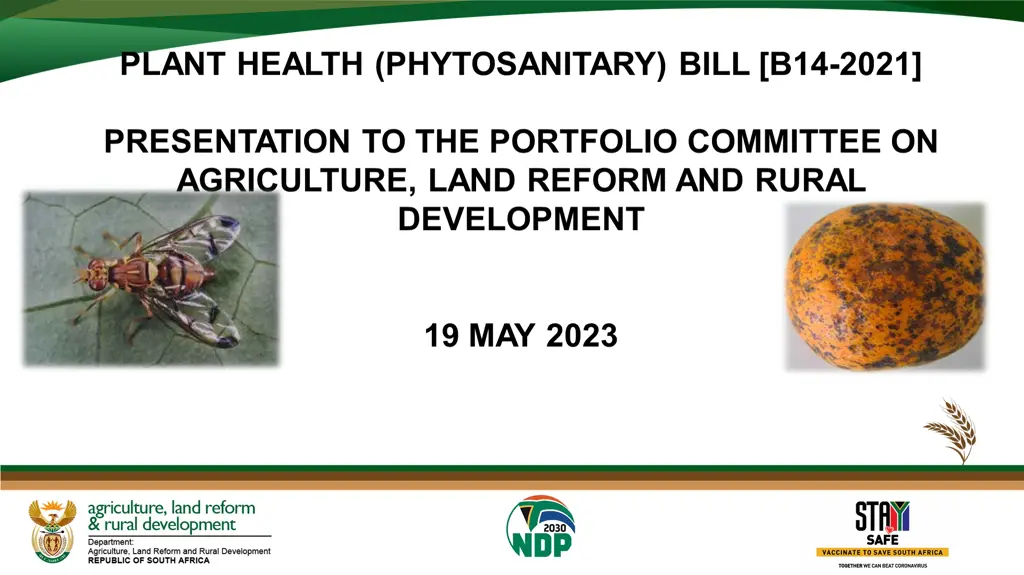


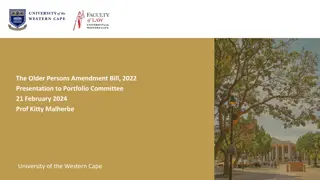
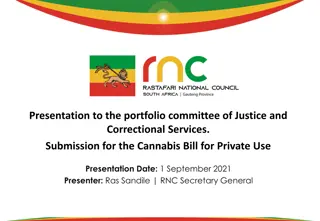
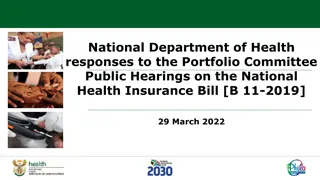
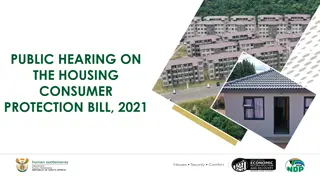
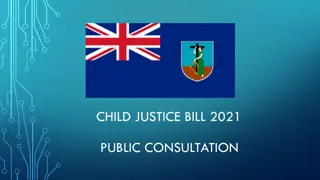



![Stakeholders' Responses to National Health Insurance Bill [B.11B-2019]: Overview](/thumb/69945/stakeholders-responses-to-national-health-insurance-bill-b-11b-2019-overview.jpg)
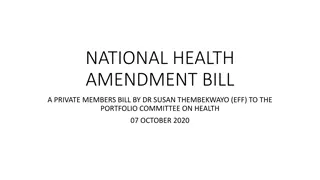
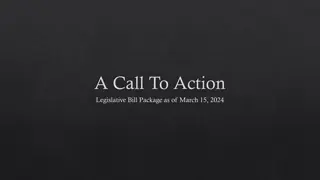
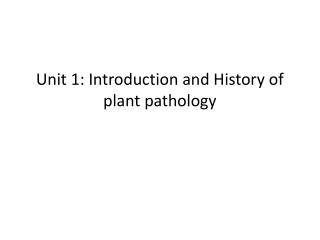



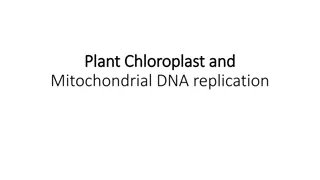
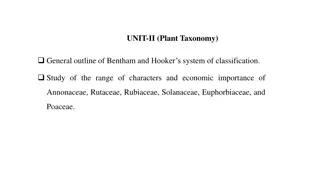
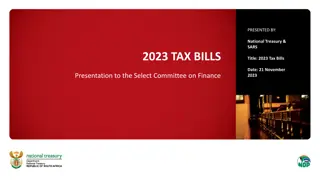
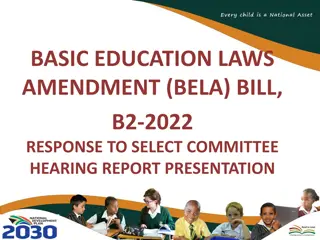
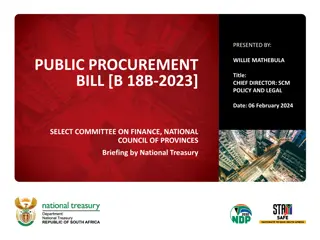
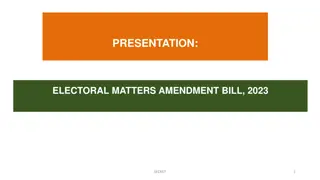
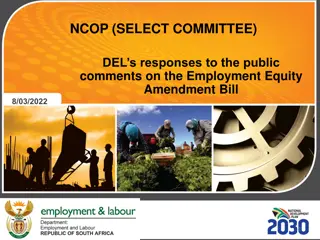
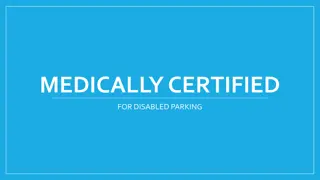
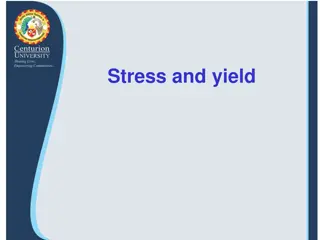



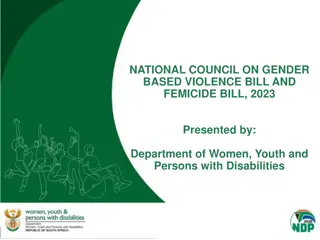
![Prevention and Combating of Hate Crimes and Hate Speech Bill [B.9B.2018]](/thumb/60513/prevention-and-combating-of-hate-crimes-and-hate-speech-bill-b-9b-2018.jpg)
